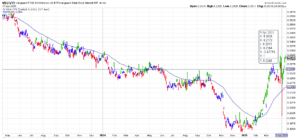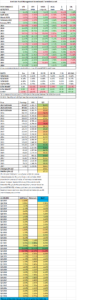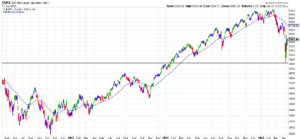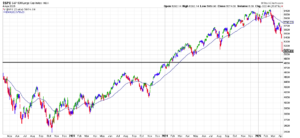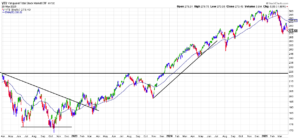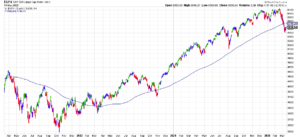SCOREBOARD
Category Archives: Uncategorized
Week Ending 5/2/2025
Week Ending 4/25/2025
Week Ending 04/17/2025
MARKET RECAP
- US stocks were off by 1.14% in a shortened trading week due to Easter.
- Trump’s haphazard trade policy was on full display. Last Friday, it was said that smartphones, computers, and other products would be exempt from tariffs. But over the weekend, some officials said that was wrong.
- On Monday, Trump said was considering pausing some auto tariffs. Hasn’t he said that before?
- On Wednesday, the administration announced new US restrictions on exports to China, resulting in a 3.1% loss for the Nasdaq and 2.2% for the S&P 500.
- China told its airlines not to order planes from Boeing.
- The US dollar continues to weaken, and the American brand continues to suffer. The amount of damage Trump is causing is enormous. He has this one crazy economist, Peter Navarro, who is just blind to the damage he is causing. The irony is that the big winner in all of this might be China, and maybe the rest of the world.
- Look at the chart below, which shows the performance of the Vanguard All-World Index (x-USA) versus the Vanugard Total Stock Market Index (the US total market). You see the international stocks breaking their negative trend to the upside right when Trump started getting crazy about the tariffs (late January / early February).
SCOREBOARD
Week Ending 4/11/2025
MARKET RECAP
- Stocks had a big rally. The SPX was up by 5.67%, and the NASDAQ by 7.29%.On Wednesday, stocks rallied by over 9% when Trump announced a 90-day pause on tariffs for just about everyone except China. However, the 10% tariff will stay in place.
- Supposedly, about 75 countries have reached out to negotiate a deal. As we have written before, if we can get tariffs to zero, then that would be a long-term win, minus the short-term damage, which is not minimal.
- But even with the pause, 145% tariffs with China and the 10% flat rate tariff (with some exceptions) is still a huge problem.
- In a bad sign, the yield on the 10-year treasury shot up from 4.01% to 4.48%. When inflation expectations skyrocket, interest needs to increase to compensate. In addition, the US seems to be losing its allure as a safe-haven for investors.The yield on the 2-year went from 3.68% to 3.96%, and the thirty-year from 4.41% to 4.85%.
US STOCKS
SCOREBOARD
Week Ending 4/4/2025
MARKET RECAP
- Trump is leading us to economic suicide – see our article on tariffs – https://envisionco.net/?p=5448.
- US stocks -9.13%, Nasdaq -10.02%. It was the worst week since March of 2020.
- Small caps (-25%) and the Nasdaq (-22%) are now in a bear market.
- Stocks are now trading at 19x 2025 estimates, but the estimates will come down.
- The VIX is at 45, a very high number historically.
- The 2-year yield is down 57 basis points year-to-date, at 3.68%. The 10-year has declined by the same amount and is now at 4.01%.
- In some good news, jobs increased by 228k in March, although that is a backward-looking number and was before all of the tariff craziness.
- Recession odds are dramatically increasing; JPM has a 60% probability.
- The only faint hope is that the courts rule that there is no “emergency” and Trump cannot just randomly increase tariffs, or that Congress pulls back the authority from Trump, or that this is indeed, just a negotiating ploy and the goal is to get everyone to zero percent tariff rates, but the damage will still be severe unless these policies are reversed very soon.
SPX
SCOREBOARD
Trump’s Dangerous Tariff Policy
Trump’s Tariff Policy: Playing with Fire
Trump is playing with fire, and the worst part is he doesn’t even realize it. He was re-elected mainly on the back of a few key issues: high inflation during the Biden era, the crisis of illegal immigration, controversies surrounding gender in sports, and other “woke” policies. Many voters hoped he would tackle these problems with strong, decisive leadership. And for the most part, he has delivered on some of these, although maybe not in the best way possible. What they didn’t vote for was a radical upheaval of the economic framework that has underpinned America’s rise as the most prosperous nation on Earth.
Instead, Trump is steering the country toward what can only be described as economic suicide, mainly through a reckless and unprecedented expansion of tariffs.
From Negotiating Tool to Blunt Force Weapon
When used strategically, tariffs can serve as a useful bargaining chip in trade negotiations. That was the hope: Trump would leverage tariffs to strike better trade deals and reduce barriers between the United States and its trading partners. But it turns out, it was all just hope.
Rather than aiming for “reciprocal” tariffs—where the U.S. matches other countries’ rates—Trump has embraced a punitive approach based on trade imbalances. This means countries with whom we run trade deficits are being hit with steep tariffs, regardless of their own tariff policies.
Take Israel, for example. It dropped its tariffs on U.S. goods to zero. Instead of rewarding that move with reciprocal free trade, the U.S. slapped Israel with a 17% tariff simply because of a trade imbalance. That’s not reciprocity—that’s retaliation. It is also really bad economics. It punishes countries doing the right thing and distorts the very idea of fair trade.
Targeting Allies, Undermining Stability
Vietnam was hit with a staggering 46% tariff, despite becoming a manufacturing alternative to China—ironically, encouraged by the Trump administration during his first term. Now, companies that followed that guidance face devastating costs, with little warning and no clear rationale.
This kind of volatility undermines the trust that makes the U.S. a reliable economic partner. One of the key advantages of investing in America has always been its predictability: rule of law, open markets, stable policies. But if each administration can unilaterally upend the trade system on a whim, what does that say about our credibility?
A Blow to Markets, and to American Exceptionalism
The equity markets have already responded harshly. Over $5 trillion in market value has been erased within the last few days, with businesses and investors now uncertain about the future of trade under Trump’s policies. This is not a temporary blip—if these tariffs persist, the impact on inflation, business confidence, and supply chains will be long-lasting and painful.
Like the “transitory” inflation we saw post-COVID, tariff-driven inflation will be just as sticky and maybe worse. The U.S. cannot simply replicate complex, highly optimized global supply chains overnight—or even over several years. The result will be higher prices for consumers, lower profits for businesses, and a less competitive American economy overall.
A Legal and Constitutional Crisis in the Making
Perhaps most alarming is how these tariffs are being enacted. Trump is invoking the International Emergency Economic Powers Act of 1977—a law meant for genuine national emergencies—to justify these sweeping economic changes. But there is no emergency, only a manufactured justification for a deeply flawed policy. This is taxation without representation: hundreds of billions of dollars in new taxes imposed on Americans, without congressional approval or public debate.
Not only does this bypass the legislative process, but it also violates existing trade agreements—including some that Trump himself negotiated. It risks permanently damaging our trade relationships and giving countries like China an opening to deepen ties with nations that feel betrayed by the U.S.
What Comes Next?
Is there a single respected economist not affiliated with the Trump administration who supports this policy? It’s doubtful. The hope, among some observers, is that Trump is using this strategy as a high-stakes negotiation tactic—an attempt to force other countries to the table to drop their tariffs to zero. But even if that’s the plan, the collateral damage is immense.
If this continues unchecked, it could lead to serious consequences—not just economically, but politically. Voters will punish Republicans in upcoming elections, especially as inflation rises and job losses mount. The tariff policy, as it stands today, is deeply unpopular, economically reckless, and fundamentally un-American in its disregard for free trade and fair competition.
Was Trump Paying Attention in 8th Grade?
Wasn’t the lesson of the 1930s that the Great Depression was made much worse because of the Smoot-Hawley tariffs? Didn’t everyone learn this in eighth grade? This is from the Senate’s own website (https://www.senate.gov/artandhistory/history/minute/Senate_Passes_Smoot_Hawley_Tariff.htm):
How did this happen? After Herbert Hoover became president in 1929, he called Congress into special session to deal with a troubled farm economy that had fallen into depression during the otherwise prosperous 1920s. President Hoover proposed a “limited revision” of the tariff on agricultural imports to raise rates and boost sagging farm prices. He then made the tactical error of trying to distance himself from the tariff debates. Republican protectionists, who controlled the House Ways and Means Committee chaired by Representative Willis Hawley, put the farm issue aside and took the opportunity to raise industrial tariffs to new highs. Hoover’s failure to object encouraged other economic interests to lobby the Senate Finance Committee, chaired by Utah senator Reed Smoot, for further tariff hikes. In protest, low-tariff Democrats and progressive Republicans slowed the tariff debate over a tedious 15-month process of congressional bargaining.
A thousand economists signed a petition, drafted by a Chicago economist, and future U.S. senator, Paul Douglas, that implored the president to veto the tariff. “Poor Hoover wanted to take our advice,” Paul Douglas mused, but he could not bring himself to break with his own party’s congressional leadership. Ignoring the experts, Hoover signed the tariff on June 17, 1930.
As the economists predicted, the high tariff proved to be a disaster. Even before its enactment, U.S. trading partners began retaliating by raising their tariff rates, which froze international trade. The tariff fight solidified Hoover’s ties with Republican regulars, but it shredded his standing among his party’s progressives. Most of the progressive Republican senators who had campaigned for Hoover in 1928 wound up endorsing Franklin D. Roosevelt for president in the next election. Nor did the tariff sit well with the voters. In 1932 they turned the majority in both houses over to the Democrats, by large margins. The voters also made clear their disdain for the Smoot-Hawley tariff by booting Jboth Reed Smoot and Willis Hawley out of office that year.
This is what Lawrence Summers said today
“This is a moment of testing for Trump’s advisors. The intellectually honest ones know that this reflects the President’s 40-year fixation, not any kind of a proven economic theory. This is the economic equivalent of what creationism is to biology or what ending vaccines is to medicine. The question is whether his advisors are going to have the courage to tell him and the courage to step away from being part of these policies, if he’s not willing to readjust.” (https://x.com/ThisWeekABC).
Final Thoughts
The U.S. should be leading the world toward freer markets and stronger global partnerships, not retreating into protectionism and economic isolation. The goal should be simple and clear: reduce tariffs to zero and let open markets determine the winners. That’s the best path to prosperity—for America and the world.
If Congress or the courts do not act soon to rein in Trump’s authority on trade, the consequences could be devastating—for the economy, our international relationships, and the long-term credibility of the United States on the world stage.
Week Ending 3/28/2025
Week Ending 3/21/2025
Week Ending 3/14/2025
MARKET RECAP
- US stocks fell by 2.24%, while international stocks dropped by just 0.53%. Bonds were about flat, down by 0.07%.
- Economists have been lowering their growth estimates for the year. Goldman Sachs dropped their 2025 outlook to 1.7% growth from 2.4%.
- Trump doubled tariffs to 50% on Canadian steel and oil but then decided not to follow through, a pattern that has become typical over the last few weeks.
- There was some good inflation news, as CPI and core CPI increased by 0.2% month over month compared to a consensus estimate of 0.3%. Year over year, CPI was up by 2.8%, down from 3.0% in January.
- On Thursday, the SP500 fell into correction territory as Trump imposed 200% tariffs on alcohol imports from the EU. The index now trades below its 200-day moving average (see chart below).
- Gold hit a record with all of the craziness.
- Consumer sentiment is taking a big hit due to tariffs and the administration’s haphazard approach. The University of Michigan survey fell by 11% from last month and is not at the lowest level since November of 2022.
- In another warning sign of a slowing economy, airlines have been warning of lower demand.
SP500
SCOREBOARD




